In supporting his party’s grassroots elections, one of the NARC Kenya Vice Chairmen, Kiraitu Murungi noted, “We intend to establish a massive movement with a national face like the (Chinese) Communist Party." The South Imenti legislator further added: "China’s economy is growing faster than that of the United States due to the organized leadership of the party. This is what we are aiming for."
Talk is cheap. But the only reason whey the country lacks organized party leadership is the fact that political parties are not mass movements -- they are not established to be that way. Secondly the individuals involved in setting up and registering political parties are only happy to settle for senior national leadership positions in ‘their’ parties. I call it the Bwana M’kubwa syndrome -- everyone is yearning for senior leadership posts. It explains why NARC Kenya has almost seventy national leadership officials. Not be left behind, ODM Kenya has over thirty national officials apart from the defacto leaders.
Politicians can talk of their wishes to wanting to make their respective political parties national organizations until the cows come home. If they are serious in their rhetoric then they have to give the people the powers to craft the national face for their respective parties. One thing is for sure, to achieve that ‘organized party leadership’ distinction it cannot start from the top down but from the bottom up.
There is a need for fundamental changes to be made in our political system and or landscape. No one can dispute that political parties have refused to democratize and as such it must be done for them. The far-reaching changes dictate that we begin by compelling major political parties to have ‘uniform party structures’. Major political parties could be defined as ‘parliamentary parties’, to avoid having to include ‘briefcase parties’ in this uniformity. One area of this standardization could be the in the presidential nomination exercise. The problems facing ODM Kenya in the nomination aspect would a thing of the past.
Another problem facing major political parties, past and present is that, in their need to balance regional representation (to give their parties a national outlook so they assert) they end up appointing individuals to represent their respective native provinces/regions. The same individuals would probably never been voted in had they faced the “party supporters-cum-members” in any form of election. In essence they end up imposing leadership on the people.
The current system, where parties start from the top, the national office, down to second tier, the branch level down to Constituency level and onto the bottom tiers location and sub-location levels is very outdated. In addition, positions such as Secretary General, Organizing Secretary, and secretaries for ‘these and those affairs’ are old fashioned party posts. Modern political parties do not have such positions unless of course one is looking up to the communist parties for party management guidance.
There is no denying that we are a tribal and sectarian society and there is a need to accept this fact in order to move forward politically. A perfect example is the recent Magarini by-election which has confirmed that ‘all politics is local’. With the support of the Coast provinces’ NARC Kenya leadership, the immediate former MP Harrison Kombe of Shirikisho Party comfortably recaptured his parliamentary seat. It did not matter that ODM Kenya bigwigs (all of whom are not wenyeji of Coast province) camped in the constituency during the final weeks of the campaigns. Their presence was of no consequence to the electorate’s decision.
In accepting this important reality check the best way forward would be to have political parties with national following be compelled ( in the new uniform system) to establish eight provincial offices. This way the side effect of the system will be to flush out from the system briefcase parties because they will be made redundant.
The ‘eight regional offices’ will have boundaries alongside those of the eight administrative provinces for easy identification and to avoid any administrative district desiring to be paired with another regional office et al.
Once established, the ‘Regional Party Offices’ or RPO should have strong and powerful Executive Committees as the top party organ. The committees’ membership slots must be divided equally to all the respective provinces’ constituencies. Each executive committee should have the same number of officials equal to the number of the constituencies in the respective province plus five. The executive committees will be bestowed with the duties and responsibilities of running and managing the affairs of the party in their respective provinces.
This way individuals from Rift Valley, Nyanza, Central and Coast provinces will concentrate with party affairs in their respective regions, and so on. In the United States, the world’s oldest democracy, each state has their own states’ parties’ offices for the Republican and Democratic parties. Even fringe parties such as Reform Party have the same uniform arrangement.
Hierarchically, right under the RPO Executive Committee, could be the Constituency Party offices (CPO) managed by a Constituency Coordinating Committee, or COC. The officials for this committee should be equal to the number of civic wards in their respective constituencies plus five. Below the COC the Civic Wards’ level offices would appropriate where it should be managed by what could known as the ‘Local Committee’ of not more than ten officials. This will make every region, every constituency and every civic ward participate in the activities and the running of the respective parties.
Above the RPO would be the National Committee that should have less than ten officials to run the office. There will be no need for secretary generals, organizing secretaries or any of those outdated positions. Most of the parties functions would be handled at regional level by the parties respective RPOs.
All the officials of the RPO Executive Committees and COC should make up their respective parties’ National Leadership Council membership.
The parties Local Committees officials together with the NLC members plus the parties’ sitting Members of Parliament and Civic Councillors should make up the Party’s National Convention membership where all presidential nominations could be selected from. There will be no confusion whatsoever as to which list of members is valid and so on. If done this way, the parties would be more organized and orderly eliminating the conflict of Kalonzo Musyoka wanting this style and Odinga interested in that style of picking their party’s presidential nominee. From the ground up and not top down.
___________________
While speaking at the launch of the Council for Legal Education/Kenya School of Law Strategic Plan at the Nairobi Safari Club, the Justice and Constitutional Affairs Minister Martha Karua rightly pointed that the quality of service rendered by the country’s lawyers is sub-standard.
I would inform Madam Karua that no one disputes that assertion. The minister noted: “In particular the quality of education and training provided by the Kenya School of Law has been singled out as being mediocre and sometimes irrelevant.” The minister hit the nail on the mark with this statement.
In most countries, even in commonwealth nations such as India and others, a Law Degree is a graduate degree or at least second degree. In Kenya it is the first degree where students are not exposed to other areas and or subjects other than those of legal and or law related. They tend to concentrate in studying to pass the exams but not gaining any knowledge that will assist them in their profession and or their daily professional lives.
Kenya’s biggest problem is that we tend to follow and continued to tag along on the British education system even if it does not fit our needs. In some areas the system does not adequately meet our needs and does not fit our unique situations. For instance an individual is respected when he comes home with a British degree even if the college/university he or she went is a mediocre one. We tend always to think overseas education is far superior to our local one.
Many would say I may be biased when I talk and praise the United States education system. But the fact remains that the US university education remains superior to any other by far. The country should look into it and copy in an effort to improve our very own system. For instance, our government is a blend of the American presidential system and the British parliamentary one. We could and should do the same in other areas such as education.
In the United States one can major in Sciences, Arts or even in Music at their undergraduate level and has access to attend law school and obtain a law degree and become a lawyer. Of course one must meet the schools’ requirements and must have done well and passed the Law School Admission Test (LSAT) as prerequisite for admission.
Now with the introduction of Parallel degrees programs the university education standards are bound to nose dive. I strongly believe that such programs are, to put it mildly, mainly money making ventures for the schools.
My bold suggestion to Justice Emmanuel O’Kubasu-chaired Council for the Legal Education, make Law Degree to be a graduate degree and not an undergraduate one as is the case right now. Prospective lawyers must first obtain their first degrees in any field of study (and or concentration) before they pursue legal profession.
___________________
It is without a doubt that seatbelts save lives. In the United States, hard data show that 63 percent of people killed in accidents are not wearing seat belts. An estimated 10,000 lives are saved each year by the use of seatbelts during motorcar accidents. The data goes on to indicate, ‘If 90 percent of Americans buckle up (wear seatbelts), it will prevent more than 5,500 deaths and 132,000 injuries annually.” The fact remains that seat belts are the most effective safety devices in vehicles today.
I bring these hard facts because I was taken aback when I read one commentary (MAKOKHA”S MEMOS) in one of the local dailies complaining about the strict seatbelt enforcement in the country. The illustrious Makhoha notes: “In this day and age, Kenyans are still being hauled off to court to answer charges of failing to wear a seatbelt while travelling in a motorcar, contrary to the Traffic Act, Cap 47.”
The comments go further and he thinks he is being funny when he added, “Yet everywhere — in the cities, towns and villages — poor souls continue to be ferried from one job to the next on the back of open pick-up trucks, lorries and other contraptions for transporting goods. There are no seats in there, let alone seatbelts. And they are ferried right under the noses of police officers who are keen to wave the traffic on. “
So what even if some ‘poor souls’ (as he puts it) break the same very law by riding on the back of the pick-up trucks where there are so seatbelts. These poor souls have no alternative but to be transported the same way goods are being ferried. The form of transportation is wrong, against the law and very dangerous to human lives but there is no choice.
It was a commentary by a supposedly educated and urbane Kenyan, let alone the fact that the writer is a respected journalist or columnist. Instead of Mr. Makohas being proud for the traffic law enforcement he believes it is wrong, ‘in this day and age’.
I would boldly point out that the Kshs 100 fine imposed to the ‘wearing seatbelt law breakers’ is too small of a fine and or punishment. It should be Kshs 1,000 for first offenders and a maximum of Kshs 5000 for any repeat offenders.
omarahmedali@gmail.com
Sunday, June 3, 2007
Subscribe to:
Post Comments (Atom)







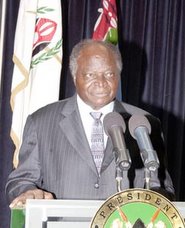


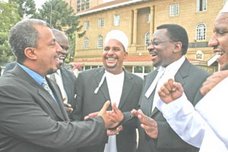
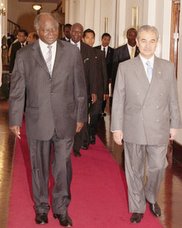

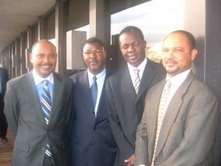
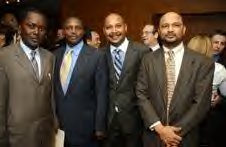
No comments:
Post a Comment